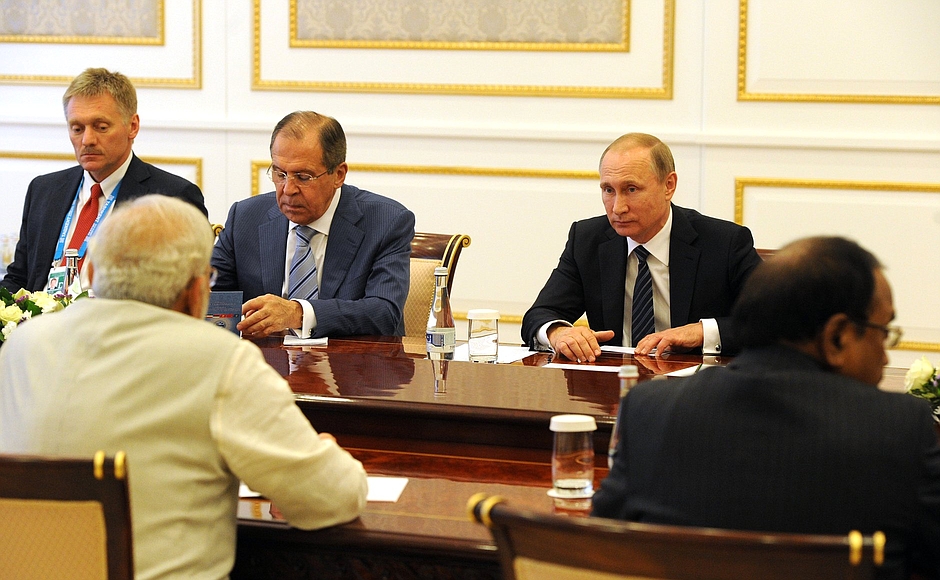23 December 2016 – Jaipur, India
by Professor B.M. Jain
Russia’s foreign policy under the Putin leadership has undergone a major transformation since Russia’s annexation of Crimea from Ukraine in 2014. The United States and EU imposed an array of sanctions against Russia, undermining its economic, trade and investment interests across the global market. Psychologically bruised by the insult and humiliation heaped upon it by the Western world, President Putin became more resolute, firmer and more intransigent in dealing with the United States and its allies and partners without calculating the cost and consequences of his policy decisions.
In this context, India’s flowering relations with the United States as its “natural ally” caused an alarming consternation in Moscow that New Delhi was heavily tilting towards to the United States, as manifest from the US-India Nuclear Deal, the burgeoning defence trade, maritime and homeland security cooperation, and the August 2016 Logistics Exchange Memorandum of Agreement between the United States and India, authorising them to use each other’s land, air and naval bases. This naturally aroused Putin’s ire against India. But much to India’s chagrin, China and Pakistan collectively sought to whip up the apparent ripples in the Moscow-Delhi relationship with the singular motivation of isolating Russia from India. They have succeeded, at least minimally, in sowing the seeds of suspicion between Russia and India. Also, Pakistan was frantically engaged in grabbing a propitious opportunity to come closer to Russia given the slash in the US military aid, as is evident from the Obama administration’s recent decision to block USD 300 million military aid to Islamabad.
Alternatively, Pakistani military elites undertook a flurry of visits to Moscow to cultivate a friendship with Russi with the underlying motive to kill two birds with one stone: to dilute the “all weather friendship” between Russia and India on the one hand, and to procure the latest version of weapons from Russia to match India’s arms capabilities on the other hand. What is more worrisome is that Pakistan is very much likely to exploit its military ties with Russia to mute its support to India on crucial issues such as cross-border terrorism in Jammu and Kashmir, on India’s permanent membership to the UN Security Council, and also on India’s membership to NSG-48. Since China and Russia have the cooperative partnership on global and regional issues to humiliate and weaken America, India must be overly wary about its fall out on Indian-Russian security and defence tie ups, although Russia will continue to supply arms to India as well as to Pakistan since its economy has been hit hard by the US and EU sanctions.
Emerging Military Ties between Russia and Pakistan

In the heydays of the Cold War, there was a “time-tested friendship” between India and the former Soviet Union under the 1971 Treaty of Peace, Friendship and Cooperation. This Treaty acted as a psychological deterrent against the United States and China, which could not prevent the emergence of Bangladesh as a sovereign and independent country. Even after the collapse of the Soviet Union in December 1991, it was President Putin to sign an agreement on strategic partnership with India in 2001. Under this, Russia continued to transfer the state-of-art weapons to India .including nuclear submarines, even though denied to China. More importantly, their mutual trust reflects from co-production of BrahMos supersonic cruise missiles, whereas there is trust deficit between India and the United States and in Sino-Indian relations.
But it is a sheer irony of the time that Russia, without taking India’s genuine concerns into account, carried out military exercises with Pakistan in its province of Khyber-Pakhtunkhwa in September-October 2016. This apart, President Putin has recently taken the decision to transfer the state-of art weapons like Mi-35 Attack Helicopters to Pakistan, including his tacit consent to the much controversial China-Pakistan Economic Corridor (CPEC), complicating the Kashmir dispute to India’s disadvantage. These developments might have a long term negative fall out on the strategic partnership between Moscow and New Delhi. At the same time, Russia should be extremely circumspect about Pakistani motives behind procuring its military hardware. Putin need not gloss over the stark fact that Pakistan used American weapons against India in the 1965 and 1971 Wars. Similarly, Pakistan misused American aid to build nuclear programme during the presence of Soviet forces in Afghanistan from December 1979 and April 1989. Also, Pakistan hoodwinked America by transferring its military aid to the Taliban and Haqqani network to help them survive rather than using the aid to fight them. Therefore, Russia must learn from US follies and its flawed policies while dealing with Pakistan. Although Russia may perceive some temporary gains in forging military ties with Pakistan, it should not take the potential risk of bedevilling its relations with India—its long-time reliable partner. In brief, Russia needs to desist from augmenting Pakistani military capabilities not only to accentuate armaments race between India and Pakistan but also to complicate the balance of power in South Asia.
Feature Photo: During meeting between Russian President Putin and Indian Prime Minister Modi during the 2016 SCO summit, Kremlin.ru, 2016
Inset Photo:Pakistani Prime Minister Sharif meeting with Russian President Vladimir Putin, July 2015– Kremlin.ru, 2016
DefenceReport’s Analysis is a multi-format blog that is based on opinions, insights and dedicated research from DefRep editorial staff and writers. The analysis expressed here are the author’s own and are separate from DefRep reports, which are based on independent and objective reporting.


